To train your nose for at-home fragrance creation, you'll need essential oils, spices, herbs, and a fragrance wheel to start your journey. Begin with daily scent exercises using common household items and fruits to build your olfactory memory. Keep a detailed fragrance journal to document your experiences and track your progress. Master basic fragrance families like floral, oriental, and woody notes before attempting custom blends. The path to creating unique personal scents awaits your exploration.
Essential Materials and Tools for Olfactory Training
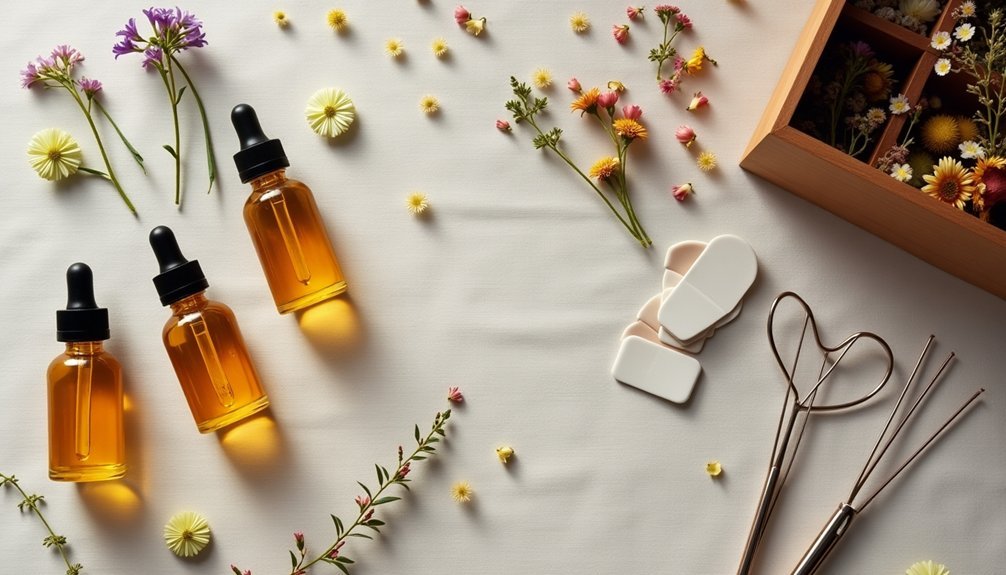
Every aspiring perfumer needs a well-organized collection of aromatic materials and tools to develop their sense of smell. Start by acquiring essential oils, spices, herbs, and fruits that'll help you understand basic scent profiles.
A fragrance wheel serves as your map, guiding you through different olfactory families and helping you categorize various notes.
Invest in a beginner's perfumer's kit containing fundamental ingredients like jasmine, sandalwood, bergamot, and vanilla. These core materials will form the foundation of your olfactory training and future fragrance creations.
Don't forget to maintain a detailed fragrance journal where you'll record your observations, impressions, and experiments with different scent combinations. Your journal will become an invaluable reference tool as you develop your nose and expand your aromatic vocabulary.
Building Your Scent Memory Through Daily Exercises
How can you develop a remarkable sense of smell? Start by engaging your olfactory senses through daily exercises that strengthen your scent memory. Your kitchen serves as the perfect training ground, offering countless opportunities to explore fragrance nuances and aroma components.
- Compare fresh and dried fruits to identify subtle differences in their scent profiles.
- Explore household items like leather goods and wooden furniture to familiarize yourself with distinct aromas.
- Slice citrus fruits and distinguish between rind and pulp scents to sharpen your recognition skills.
- Document your experiences in a personal olfactory journal to build your fragrance vocabulary.
Make these exercises part of your daily routine, and you'll develop a sophisticated nose that can identify and remember complex scent combinations.
Remember to smell intentionally and take note of each unique component you discover.
Mastering Common Fragrance Families and Notes
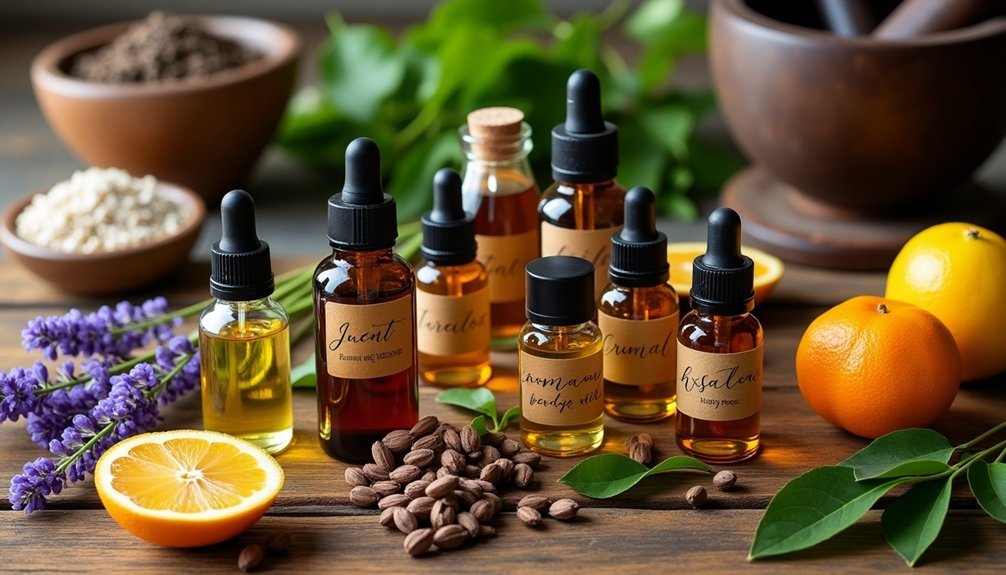
Understanding fragrance families and their characteristic notes forms the foundation of successful perfume creation. As you develop your olfactory memory, you'll need to recognize how different scent profiles interact and complement each other.
| Family | Key Notes |
|---|---|
| Floral | Rose, Jasmine, Lily |
| Oriental | Vanilla, Amber, Spices |
| Woody | Cedarwood, Sandalwood |
| Fresh | Citrus, Green, Aquatic |
| Aromatic | Lavender, Herbs, Mint |
In fragrance creation, start by exploring each family individually. When working with florals, notice their romantic and uplifting qualities. Oriental notes offer warmth and sensuality, while woody elements provide grounding characteristics. Fresh notes deliver invigorating sensations perfect for daytime wear. By understanding these fundamental relationships, you'll develop the skills needed to blend sophisticated perfumes that resonate with your creative vision.
Blending Techniques for Creating Custom Scents
With a solid grasp of fragrance families, you're ready to explore the art of blending custom scents. Start by combining base notes, middle notes, and top notes in a 20:50:30 ratio to create a harmonious blend that evolves beautifully over time. Different blending techniques will help you achieve your desired scent profile.
- Create tinctures by steeping materials in alcohol to extract their aromatic properties.
- Layer your scents strategically, starting with base notes and building upward.
- Document your experiments in a fragrance journal, noting proportions and scent characteristics.
- Allow your creation to mature for at least 48 hours before making final adjustments.
Remember that successful fragrance creation requires patience and precision. Your custom blend will reveal its true nature during the maturing process, so give it time to develop before making your final assessment.
Documenting and Evaluating Your Fragrance Journey
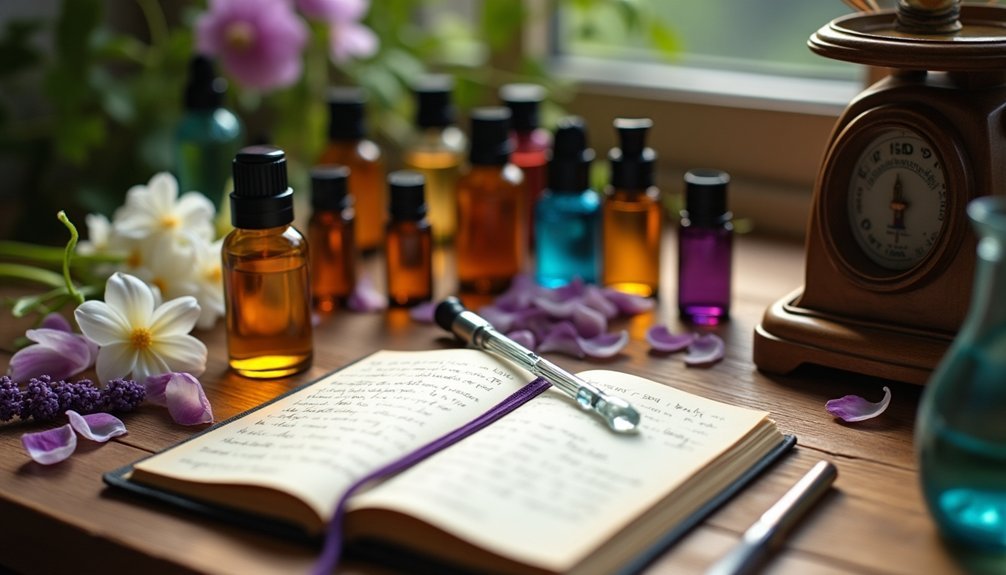
Success in fragrance creation depends heavily on maintaining detailed records of your olfactory experiments and experiences. Start by keeping a dedicated fragrance journal where you'll document each scent encounter, noting specific notes, emotional responses, and wearing occasions.
Develop a systematic approach to evaluate your fragrances using a numerical scoring system. Rate aspects like longevity, projection, and overall enjoyment on a scale of 1-10. As you build your collection of entries, you'll begin to recognize patterns in your preferences and identify which notes work best for different settings.
When you blend your own fragrances, record precise measurements and ingredients. Compare your insights with online fragrance communities to understand how your perceptions align with others.
This documentation process helps you refine your creations and build a valuable reference for future experiments.
Frequently Asked Questions
How to Train Your Nose for Perfumery?
You'll strengthen your nose by smelling everyday items, practicing scent identification, documenting your experiences, and studying fragrance materials. Compare similar scents side-by-side and build your olfactory memory through regular practice.
Can You Be a Self Taught Perfumer?
Yes, you can become a self-taught perfumer. You'll need dedication to learn about fragrance materials, practice scent identification daily, study perfume compositions, and experiment with creating your own unique blends through hands-on experience.
How to Train Your Nose to Smell?
You'll develop your sense of smell by actively sniffing various items daily – herbs, spices, fruits, and flowers. Keep a scent journal, compare similar scents, and practice identifying individual notes in complex aromas.
How to Train to Become a Perfumer?
Start by studying aromatics and scent families, practice smelling ingredients daily, maintain a fragrance journal, and take perfumery courses. You'll need patience, as becoming a skilled perfumer requires years of dedicated training.
In Summary
You've now got the foundational knowledge to start your fragrance-making journey. Remember to trust your nose, keep detailed notes of your blending experiments, and don't be afraid to make mistakes. As you continue practicing with different scent combinations and refining your olfactory skills, you'll develop your unique creative signature. The world of custom fragrance creation is yours to explore and master.
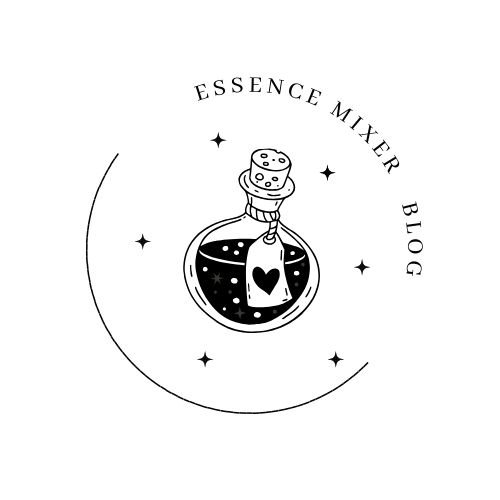
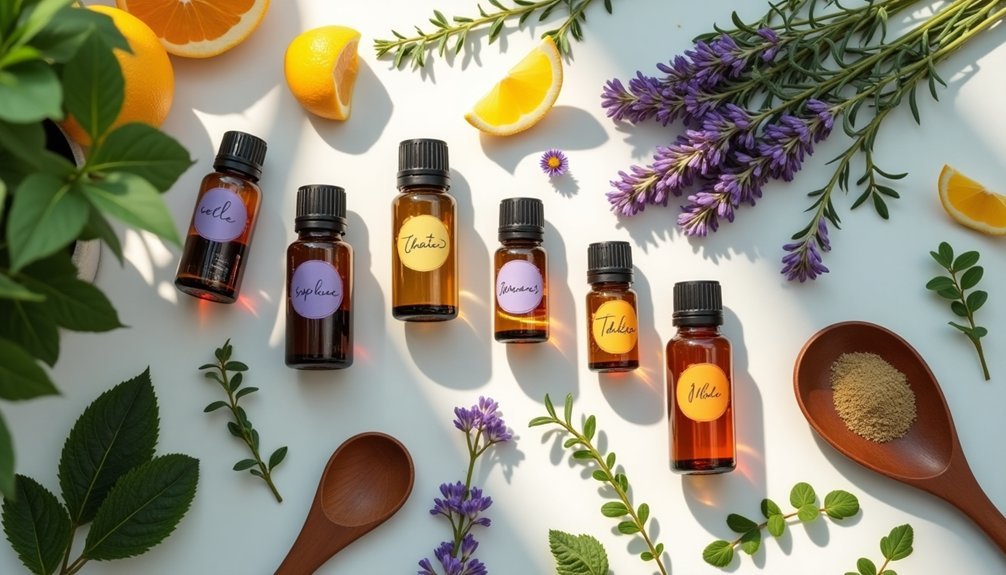



Leave a Reply